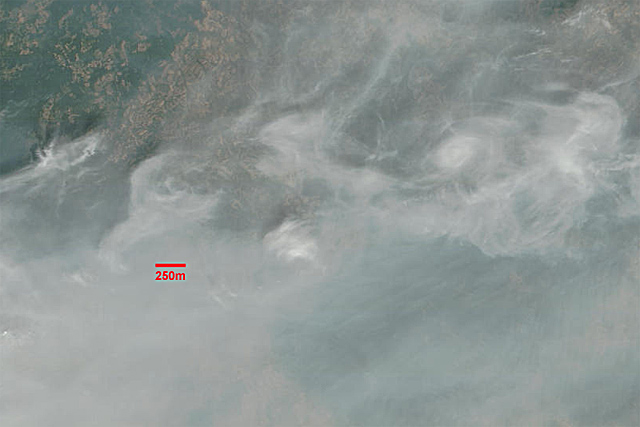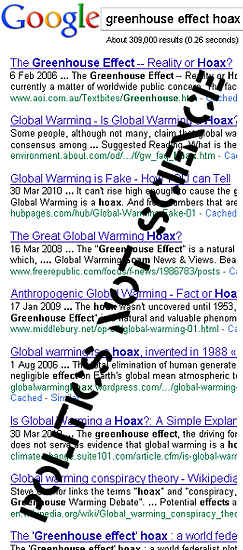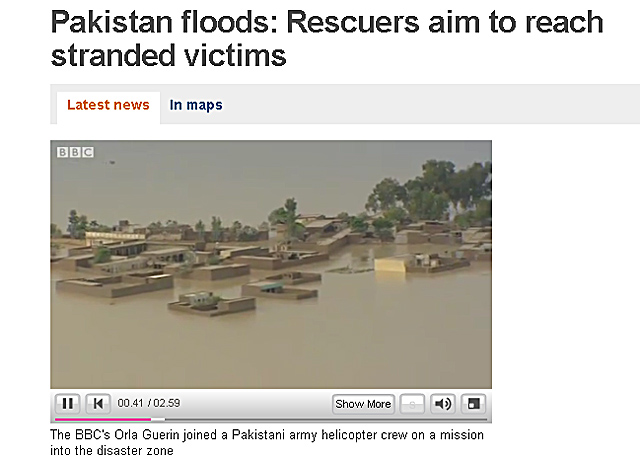A Planet & Politics snapshot, 4th August 2010, updated 6th August when the number of
people affected by Pakistan flooding had risen from 3 million to 12
million.
BACK
TO WEATHER-BLOG MENU
New!
Fine Art Prints & digital images for sale-
Welsh Weather
& Dyfi Valley landscapes Slide-Library - Click HERE
| Climate models predicted a
higher frequency of heatwaves, record temperature highs, extreme
rainfalls, droughts and wildfires. That's exactly what's happening
right now. “What’s happening with the planet’s climate right now needs to be a wake-up call to all of us, meaning all heads of state, all heads of social organizations, in order to take a more energetic approach to countering the global changes to the climate.”
Dmitri
Medvedev, July 30th 2010
"Each of the last three
decades has been much warmer than the decade before. At the time, the
1980s was the hottest decade on record. In the 1990s, every year was
warmer than the average of the previous decade. The 2000s were warmer
still.” "Sixteen of 225 nations
on Earth have set extreme highest temperature in history records this
year, the most of any year. The year 2007 is in second place, with
fifteen such records."
Dr Jeff
Masters, Weather Underground, August 2010 "Don't
the climate alarmists know that proxies are only any good at proving
that the MWP was a really really warm global phenomenon when the world
warmed up for no reason at all which PROVES that the world can warm up
for no reason at all at any time and it's nothing to do with us. Except
that the world isn't even warming up. And if it is warming up it's for
no reason at all."
Anonymous
disliker of climate science - posted on an Internet comments thread
Despite
each and every twist and turn in
the circular arguments offered by the politicised opposition to climate
science, events are unfolding pretty much as the science has indicated
that they would. Enhanced monsoon rainfalls in Pakistan have affected
as many as 12 million people, causing death, homelessness, destruction
of property and infrastructure in the resultant floods. Tremendous
flood events have also affected China and the American Midwest.
Elsewhere, prolonged drought and record-breaking high temperatures have
been experienced - notably over a large part of Russia where wildfires
have added to the chaos. The Russian grain harvest has been severely
affected as a consequence, which in turn will reduce the amount
available for export with the attendant threat of increased food
prices. Ironically, some parts of South America have witnessed
unusually cold winter conditions. Overall, things are not looking so
good in many places.
above:
TERRA satellite image of an area SE of Moscow, showing the smoke from
wildfires, 02/08/2010. I've
never been a fan of the term
"Climate Change". Looking at what is currently going on, I find
"Climate Destabilisation" more apt. I'll explain why. Although
there have always been severe
weather outbreaks around the planet, in the past 5000 years or so,
during which human civilisation developed on a large scale, the
frequency of extreme conditions has remained relatively steady. That
relatively stable climate has been a major factor in our societal
development: it has, most of the time, permitted us to grow food and
expect to be able to harvest it, to develop infrastructure on the
surface of the planet and expect to be able to go on using it. As a
consequence, we are very tied-down to the ground around us: unlike
nomadic peoples, we cannot just simply up and move on if conditions
necessary for population support deteriorate. Any
increase in the
frequency of extreme conditions has the potential to undermine a lot of
what we have achieved as our civilisations developed over these past
few thousand years. That's why I term the risk we are taking as
"Climate Destabilisation".
WHAT CAN BE LEARNED
FROM THE PAST? To
get this framed into some kind of
perspective we need to look back at the climate of the more distant
past, which, although relatively stable in terms of the history of our
civilisation, has exhibited major changes over a much longer
(geological) timescale. Earth's
geological history records
periods of much warmer conditions than those of today (hothouse) and
also relatively short (on the scale of a few million years) periods
dominated by fluctuating cold (glacial) and mild (interglacial)
conditions (icehouse). We live within an interglacial today.
Transitions from interglacial to glacial and back typically take
thousands of years to occur: for example, the last glacial maximum was
about 18,000 years ago but the transition into the familiar climate of
the modern age - the Holocene - was only complete 10,000 years ago. Large-scale
climate changes of this type
are caused by a number of factors - "forcing agents" - working
together. The climate record featured below (reference 1 at the end of
this page) is from an Antarctica ice-core from which data have been
obtained going
back more than 400,000 years. It shows a regular series of spikes along
the blue line (temperature) that mark the interglacials and dips that
mark glaciations. It is important to point out that any one of these
major fluctuations either way, if it happened now, would disrupt human
civilisation on an unimagineable scale.
Think
of the carbon dioxide as the
interest. The initial trigger of the warming is the equivalent of you
going to get the loan. In glacial-interglacial cycles, the triggers are
the Milankovitch Forcings - the various orbital variations that happen
on a regular basis every few tens of thousands of years and that affect
the amount of solar radiation received by the Earth's surface by a
little more or a little less. In the transition to an interglacial,
Milankovitch Forcings cause the first few hundred years of warming but
after that, feedback mechanisms for large-scale carbon dioxide release
caused by increased temperatures come into play. These include
permafrost melt and release from the oceans - and it is then that the
"interest" kicks in as carbon dioxide, due to its heat-trapping
properties, acts as a warming amplifier. The
graph above shows carbon dioxide
levels
varying between about 180 (glacials) and 290 ppm (interglacials).
Current levels are around 390ppm, with the extra having been added by
fossil fuel burning since the Industrial Revolution (in geological
terms, strictly a "one-off" event) and they are rising
year-on-year, so they are way above any point over the past few
glacial-interglacial cycles.
above: the Kremlin through the smog - screengrab from a video - August 6th 2010
So,
how are the politics shaping up
these days? At
first glance, nothing much seems to
have changed (see reference 2 at the end of this page). The same old
arguments are being trotted out by the same people - it is virtually
copy-and-paste, copy-and-paste. However, I and others have recently
noticed one interesting thing: the pretty much simultaneous iteration,
or in some cases reiteration, of the stance of some of the leading
members of the political opposition. Here's an example (reference 3 at
the bottom of the page - with the important bit highlighted): "I am delighted that this simple and
clear but authoritative statement of the reality of the "greenhouse
effect" has been posted here. Too many inaccurate statements to the
effect that there is no greenhouse effect have been published recently,
and they do not deserve to be given any credence. The true debate in
the scientific community is not about whether there is a greenhouse
effect (there is), nor about whether additional atmospheric CO2 causes
warming (it does), nor about whether CO2 concentration is rising (it
is), nor about whether we are the cause (we are), but about how
fast CO2 concentration will rise (for a decade it has been rising at a
merely-linear 2 ppmv/year, against the IPCC’s projection of an
exponential increase at today’s emission rates), how much warming a
given increase in CO2 concentration will be expected to cause (around a
third of what the IPCC projects), whether attempting to mitigate future
"global warming" will make any real difference to the climate (it
won’t: remember Canute), whether the cost of forestalling each degree
of "global warming" will be disproportionate to the climatic benefit
(it will), and whether focused adaptation to any change in the climate,
where and if necessary, will be orders of magnitude cheaper than trying
to prevent that change from occurring in the first place (yes)." This
may well be the first and last time
that I quote Monckton of Brenchley on here! However, this post, on the
political opposition website Watts Up With That, and the guest post by
Ben Herman and Roger Pielke Snr it refers to, and a similar piece by
Roy Spencer on his own site at broadly the same time, set out the
stance that the greenhouse effect is real, additional carbon dioxide
causes warming, it is rising and we are the cause. Where these
predominantly political writers now seem to differ with most climate
scientists is with respect to how much warming is likely to occur and
whether it is worth doing anything about it. Thus, it appears, the
political debate is being reframed.
Scepticism is an
important quality for any good scientist. To seek the truth, each set
of observations, each hypothesis, each conclusion and each paper
requires questioning and scrutiny - as indeed goes on in all the
scientific disciplines. You don't get such a thing as "proof" in
science: what you have in the strongest theories is an overwhelming
weight of scrutinised evidence in their favour. Scepticism involves
that process of questioning, scrutiny and weighing-up. However, what
one sees on the blogosphere is completely different in many cases.
Here, firstly carbon dioxide is unconditionally rejected from the
equation and secondly, alternative theories published on other blogs by
leading Opposition members are often unquestioningly accepted - indeed,
welcomed with open arms. To call the people who are doing this
"sceptics" is a completely incorrect use of the word. They are simply
rejecting something that they find politically indigestible and
clutching at any straws that appear to support their worldview. That is
why some refer to them as "deniers", though, having looked into the
situation in some detail in recent years, I now prefer "political
opposition", because, although in some cases a state of denial (a
perfectly common human reaction to a perceived threat) is evident, the
nature of the online debate is primarily political - there is as much
focus on the people, and often much more, than there is on the hard
science. Science and politics
also work on different timelines with politics tending to be focussed
on the short-term. We geologists play about with multimillion-year
timescales and climate predictions cover decades and centuries - quite
different timescales to the year-by-year economic fluctuations that
politicians wrestle over. I am sure that this is also a factor in the
political opposition to climate science. A classic example of
the timescale effect occurred last winter - at least in the areas where
it was unusually cold, such as the UK. The opposition loves to point
out that a single flood, storm or heatwave is just "weather" and
"proves" nothing about climate. But if I had a pound for every time,
last winter, that I read on a snowy morning, on some message-board or
other, "so much for global warming!" I'd now be extremely wealthy! But,
on the other hand, the weather disasters occurring in Russia, China,
Pakistan and elsewhere are consistent with climate predictions that
indicate a greater frequency AND severity of such things. By the way -
the predictions don't eliminate cold winters from the picture for the
time being, either. But to finish with, as the NOAA's Deke Arndt
recently put it: "Climate
trains the boxer but weather throws the punches".
1.
Petit J.R., Jouzel J., Raynaud D.,
Barkov N.I., Barnola J.M., Basile
I., Bender M., Chappellaz J., Davis J., Delaygue G., Delmotte M.,
Kotlyakov V.M., Legrand M., Lipenkov V., Lorius C., Pépin L.,
Ritz C., Saltzman E., Stievenard M. (1999). "Climate and Atmospheric History of the
Past 420,000 years from the Vostok Ice Core, Antarctica". Nature
399:
429-436. 3. See: http://wattsupwiththat.com/2010/07/23/quantifying-the-greenhouse-effect/ |
BACK TO WEATHER-BLOG MENU New! Fine Art Prints & digital images for sale- Welsh Weather & Dyfi Valley landscapes Slide-Library - Click HERE |



 That
is in strong contrast to
many who vociferously insist that the whole thing all the way from the
"greenhouse effect" upwards is a "scam" or "hoax" and it was
interesting to observe the responses in public comments, some of which
were openly hostile to their onetime heroes. Yet this is a common
feature. Read through any online debate on climate science and the
variety of "alternative" theories to explain how the climate works is
as diverse as the pebbles on a beach. The only thing they have in
common is that carbon dioxide cannot possibly be involved!
That
is in strong contrast to
many who vociferously insist that the whole thing all the way from the
"greenhouse effect" upwards is a "scam" or "hoax" and it was
interesting to observe the responses in public comments, some of which
were openly hostile to their onetime heroes. Yet this is a common
feature. Read through any online debate on climate science and the
variety of "alternative" theories to explain how the climate works is
as diverse as the pebbles on a beach. The only thing they have in
common is that carbon dioxide cannot possibly be involved!